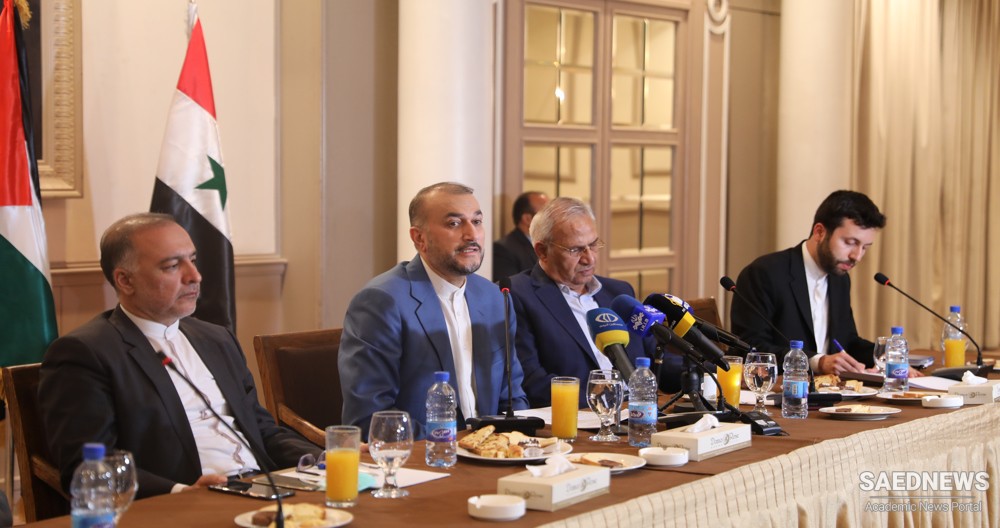Damascus, SAEDNEWS: Iran’s top diplomat made the remarks in a Saturday evening meeting with the representatives of Palestinian resistance groups in the Syrian capital, Damascus, where he is on an official visit. Noting that the issue of Palestine is still the first priority for the Muslim world, Amir-Abdollahian reiterated Iran’s categorical support for the people of Palestine until they liberate their motherland and establish a single Palestinian government with al-Quds as its capital.
“At the present time, Israel is going through its worse security and political conditions. However, there are those who think they can divert public opinion [from problems in their own countries] through normalization of relations with Israel,” Iran's top diplomat said.
A number of regional Arab countries, including the United Arab Emirates and Bahrain normalized their ties with the occupying regime as part of the so-called Abraham Accords, which were mediated by the administration of then US President Donald Trump in 2020. Morocco and Sudan followed suit by inking similar agreements with Tel Aviv.
Palestinians and their regional and international supporters have denounced the agreements as a “stab in the back” of the Palestinian cause of liberation from Israeli occupation and aggression.
Iran's foreign minister regretted the move by these countries, saying they have turned a blind eye to the issue of Palestine and are trying to cover up their domestic problems by getting closer to the Zionist regime.
“Such measures amount to betraying the lofty cause of the oppressed people of Palestine in their fight against the oppression and aggression of the usurping Zionist regime,” Iran’s foreign minister said.
Massive fire breaks out at Israeli military facility northeast of al-Quds
A massive fire broke out at an Israeli military facility in the West Bank early on Saturday amid rising tensions in the occupied territories.
Amir-Abdollahian added the countries that have entered such agreements with Tel Aviv, think they can solve their own domestic problems by doing this, but they are “definitely making a mistake,” since the occupying regime itself is “grappling with numerous issues.”
Over the past years, especially during the last few months, several incidents have busted the Israeli regime’s security and political invulnerability myths.
Last May, the regime launched its fourth wholesale war against the Gaza Strip only to be targeted with at least 4,000 rockets flown by the Palestinian territory’s resistance movements.
Zionist regime incapable of defending itself: IRGC chief cmdr.
The IRGC’s chief commander portrays a dismal picture for the future of relations between the Israeli regime and regional countries.
In September, six Palestinian prisoners escaped a high-security prison in the northern part of the Israeli-occupied territories, using a tunnel that they had dug with a rusty spoon. Palestinians and their supporters hailed the dramatic jailbreak as a slap in the face of the occupying regime and its sprawling security apparatus.
Political uncertainty has also been haunting the Israeli regime for the past four years, forcing it to dissolve the parliament in several cases and hold new general elections.
Elsewhere in his remarks, the Iranian foreign minister introduced resistance as the only way of tackling the issue of Palestine’s occupation by the Zionist regime.
"The experience gained in the last seven decades shows that a fundamental solution to the issue of Palestine is only possible through resistance," Amir-Abdollahian said, adding, “We stand by the Palestinian nation with all our might until realization of their goals, considering this to be incumbent upon us on moral and religious grounds.”
Amir-Abdollahian concluded his remarks by denouncing war, whether it was in Ukraine, Palestine or Yemen, saying “[any region’s] problems must be solved by the people of that region.”


 Iran FM in Damascus to discuss issues of mutual interest
Iran FM in Damascus to discuss issues of mutual interest














































